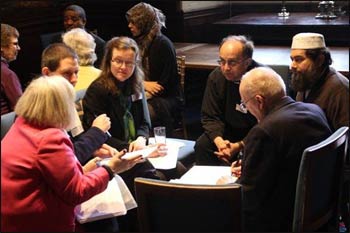Twelve Quick Talking Points
Much of the antagonism toward Muslims today springs from misunderstanding and outright misinformation. Often we don't know what we don't know until we're presented with the facts. These talking points bring new understanding and open doors. When we discover we've been mistaken - not once, but several times - we often develop a new curiosity about what really is going on around us.
Click here for a pdf you can use to create a handout of these twelve points. |
Photo: Christian Muslim Forum UK
|
Note:
Unlike Hebrew and Christian Scriptures, the Qur’an consists of only one book, A Qur'an reference lists only chapter and verse; for example Q3:48 |
|
